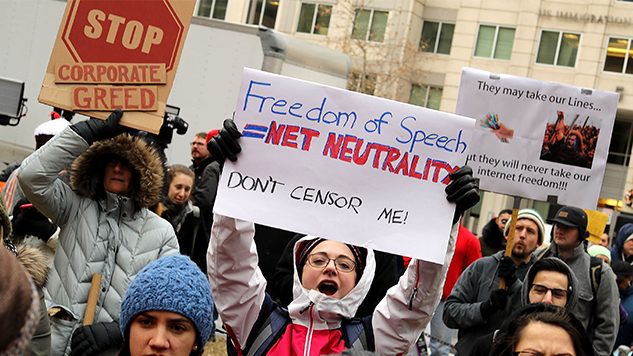Over 80 percent of Americans agree with the “basic tenets of net neutrality,” according to a Comparitech poll of more than 1,000 people. The survey comes after the “Save the Internet Act” was introduced by Democrats in Congress in early March, which would repeal the Federal Communications Commission’s Restoring Internet Freedom Act (a misnomer if ever there was one), thus resurrecting regulations from the 2015 Open Internet Order. Under this now-defunct order, internet service providers were categorized under Title II of the Communications Act, which meant they were classified as a “telecommunication service” and regulated like utilities. Considering the ubiquity of internet use, this should be a no-brainer, right?
In case you need a quick refresher course on what net neutrality is and why it matters, here’s a handy explanation from Paste contributor Roger Sollenberger:
Right now everyone who pays for internet basically gets access to the same internet. You can pay more for faster broadband speeds, but that speed applies across the board. In the future, if ISPs choose, they can tailor packages and speeds to their liking. Popular example: If you have Netflix, you might in the future have to pay a Netflix access fee to Verizon on top of the subscription fee you already pay Netflix. If you don’t pay the fee, Verizon might block Netflix altogether, or divide packages into “fast” and “slow” lanes, giving some consumers a suboptimal “throttled” speed on the site that will degrade your experience in a targeted way. For instance, imagine Comcast developed its own Netflix competitor. They would have every incentive and now the right to make Netflix suck on their platform, directing consumers to Comflix or whatever. It would present enormous Comflix of interest (!!!) and frustrate consumers with mob-like practices: “Nice Netflix you’ve got there—shame if something happened to it. Oh, wait, what’s that? You’re willing to pay an extra $20 a month? Never mind, good sir.” This is sort of like it is today with premium cable channels.
Not only that, but Sollenberger also points out that ISPs could influence where we get our information in the same way, one of the more dangerous consequences of not having net neutrality.
The “Save the Internet Act” would bring back the FCC’s Obama-era rules that ensured net neutrality. While the bill was introduced by Democrats, the Comparitech poll shows across-the-board support from Americans on both sides of the aisle on this particular issue, with almost 87 percent of Democrats, almost 80 percent of independents and 77 percent of Republicans supporting the “basic tenets of net neutrality.” Even among those who disagreed with net neutrality, 55.8 percent said they still thought ISPs should be considered a “telecommunication service” (which they would be under Title II).
